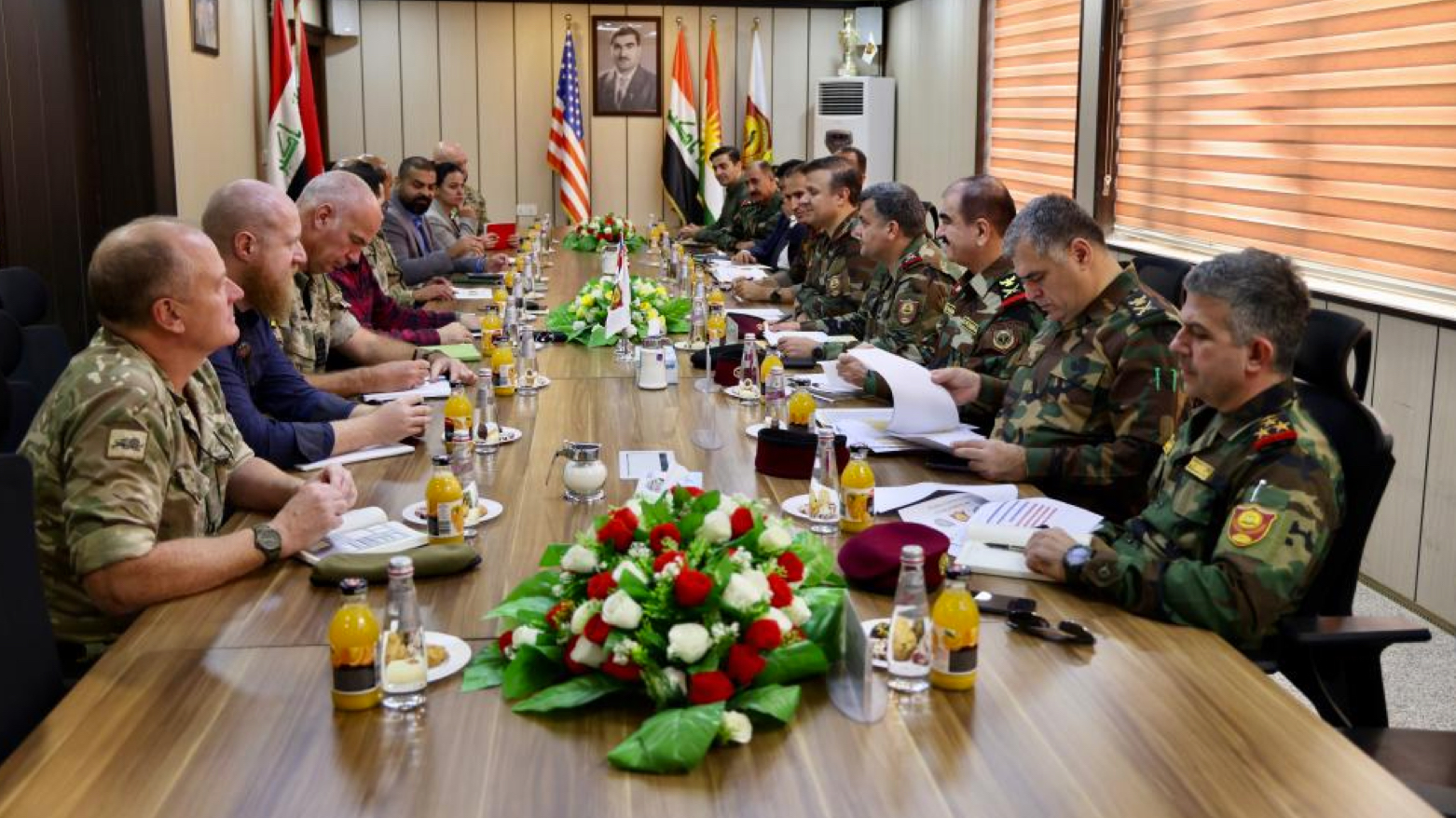Ministry of Peshmerga discusses Peshmerga reform with US-led coalition

ERBIL (Kurdistan 24) – The Ministry of Peshmerga (MOPA) on Thursday met with commanders of the US-led coalition to review the Memorandum of Understanding (MoU) between the US and the KRG.
In the presence of the @KRG_MOPE Chief of Staff, senior officers, the commander of coalition forces in IKR, Head of the Security Cooperation Office at the #US Consulate in erbil, monthly assessment of the #MOU between the @KRG_MOPE & the US @DeptofDefense was conducted. pic.twitter.com/2M7pAFJn80
— Ministry of Peshmerga (@KRG_MOPE) November 2, 2023
“In the presence of the @KRG_MOPE Chief of Staff, senior officers, the commander of coalition forces in IKR, Head of the Security Cooperation Office at the #US Consulate in erbil, monthly assessment of the #MOU between the @KRG_MOPE & the US @DeptofDefense was conducted,” the Ministry of Peshmerga said in a post on the social media platform X, formerly known as Twitter.
On Sept. 20, 2022, the US signed a renewed Memorandum of Understanding (MOU) with the Kurdistan Regional Government (KRG), in which both sides agreed to a process of reform for the Peshmerga forces under the Ministry of Peshmerga Affairs (MoPA).
Together with the Netherlands, the US, and the UK, Germany forms the Multi-National Advisory Group (MNAG) that supports the project to establish an unified and accountable Peshmerga force under the control of the KRG.
Read More: Coalition commander calls for accelerated Peshmerga reforms
In August, the Commander of the Combined Joint Task Force-Operation Inherent Resolve (CJTF-OIR), called for accelerated Peshmerga reforms and the appointment of a Minister of Peshmerga.
Read More: PM Barzani, Coalition Commander discuss Peshmerga reform, situation in east Syria
On Sept. 21, Kurdistan Region Prime Minister Masrour Barzani met with Major General Joel Vowell, the Commander of Combined Joint Task Force - Operation Inherent Resolve (the US-led coalition against ISIS), and discussed the Peshmerga reform process.
During the meeting Prime Minister Barzani "emphasized the need to maintain and accelerate the unification process as set forth by the Ninth Cabinet's reform agenda and obstructing party interference and personal interests from affecting the ministry."
On Oct. 31, during a discussion organized by the Foreign Policy Research Institute (FPRI), Kamaran Palani, a Research Fellow at the Middle East Research Institute said that the barriers to Peshmerga reform are caused by the lack of political will by the ruling Kurdistan Democratic Party (KDP) and the Patriotic Union of Kurdistan (PUK) to reform.
“So unfortunately, at the moment, there appears to be a limited will or lack of commitment within the primary leadership of the PUK and KDP to undertake the reforms within the Peshmerga,” he said.
In the past year, @KRG_MOPE has made progress toward achieving Peshmerga reforms. But important steps remain, including a comprehensive plan to bring partisan Peshmerga forces under MoPA. Read my analysis in @FPRI. ⤵️https://t.co/QAK6ctEshW… https://t.co/XN6ywagZsM
— Myles Caggins III (@MylesCaggins) October 31, 2023
Retired US Army Col. Myles B. Caggins III, a former spokesman for the US-led Coalition in Iraq and Syria, who recently wrote a piece on Peshmerga reform, during the event mentioned that the Peshmerga reforms were first announced as an initiative of the Kurdistan Region government with the support of US, UK, Netherlands and Germany.
“There was a checklist of about 35 different action items. That list has morphed over time,” he said. "There's no expectation that there would be the achievement of all these reforms, but that these reforms will be implemented progressively, but also assessed quarterly and annually between the United States and the Ministry of Peshmerga.”
He also underlined that Peshmerga reform is related to institutional efficiency and 'doing things better.'
“In Washington, there's close scrutiny on the pace of the Peshmerga reforms and one of the the levers or the things Washington is doing, in accordance to the Memorandum of Understanding that was signed in 2022 is reducing the amount paid in stipends to the Ministry of Peshmerga every year and then by 2026 if things go at the current pace, the Ministry of Peshmerga should be able to fund itself,” Myles B. Caggins II concluded.
